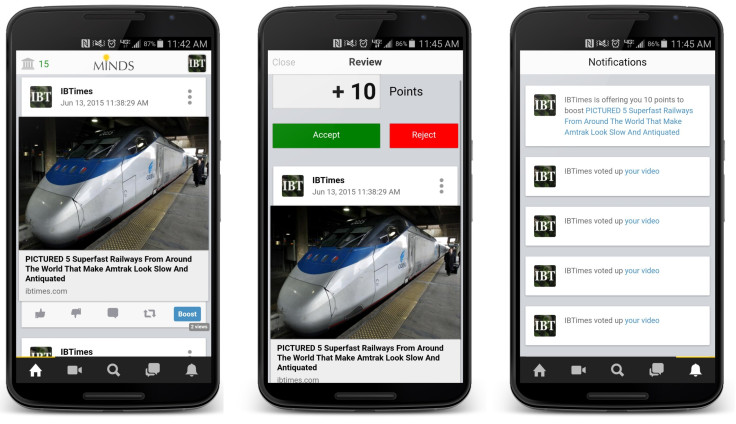Facebook’s Latest Challenger: Social Network 'Minds' Pushes Privacy And Transparency

Bill Ottman has spent the past decade pushing for paradigm shifts in the consumption of news and conversations around media. His latest target: Facebook.
In the age of social networks and several loud Facebook competitors, Ottman launched Minds.com as the first open-source and encrypted network. The site began in 2012 and Monday rolls out in a public beta along with the debut of an iOS and Android app. He prioritizes transparency in what the site does and how it works and the protection of users' personal data and use of the site.
"Our initial goal is to encourage people to diversify their social experience with a network that offers them privacy and rewards them," Ottman said.
As the head of several online news sites, including the Alternative World News Network, the 30-year-old New Yorker is all too familiar with Facebook's power of distribution. Ottman worked with other sites to share and distribute content on other's Facebook pages, often paying them "under the table," as in without any financial exchanges directly on or through the social network. That underground economy is one element that Ottman thought should and could be formalized, he said.
Many businesses -- and media publications -- have to come to rely on Facebook to reach old and new customers with content pages on the site. That dependence can be risky given Facebook’s control over what appears on a user’s feed, Ottman notes.
Others have discovered that the hard way. Nonprofit Big Fluffy Dog Rescue announced it would be closing operations in June, blaming Facebook’s algorithm. Over the past month, donation intake has dropped 55 percent. “This has everything to do with how Facebook feeds work now and nothing else. At the moment, this is insurmountable,” the company wrote.
Minds seeks to address that barrier through its points system, referred to as “digital currency.” Every network user can earn points by voting, commenting, sharing and subscribing to others' content or uploading their own; points can also be purchased, similar to what is done in mobile games like Candy Crush. Users can then cash in those points for views -- either for a boost site-wide or in a negotiated deal on the page of another user. For now, each action accumulates one point and one point is worth one view.
“That could change. We want users to decide the evolution of the site, for changing the point system or adding a new feature. We want it to be a democratic network,” Ottman said.
Whether that paid system grants more power to big brands with hefty advertising budgets isn't a concern for Minds, Ottman said.
Viral posts so far on the network have varied in topic and length. For example, one video of a woman befriending a seal garnered over 420,000 views. An explanation of Tesla's home battery system drew 370,000.
As to potential abuse of this system, Minds has extensive monitoring tools in place, Ottman said. The team can see in real-time who the top point holders are and how fast they are earning points. Users will also be able to report.
This video describes key features of the network’s system:
Ottman said that Minds has taken a hard stance on privacy in terms of keeping sensitive data privacy. Unlike Facebook, where the network allegedly accesses and has the rights to all private messaging, Minds encrypts all user messages. The site is therefore unable to see or share what transpires. Users’ email addresses are also encrypted.
“The funny thing about Facebook’s privacy situation is they say, ‘Oh, we have all these privacy settings,’ but they don’t have the option for, ‘Hey, Facebook, I don’t want you seeing my data,” Ottman said.
Minds allows anonymous accounts and does not require users’ real names — a disputed feature, notably by the drag queen community, of Facebook. Users can not set their accounts as private, for now, but a user cannot engage with someone without accepting their request. The site also has blocking tools in place. But with encrypted messaging, the question is whether the site could be used for illegal activity.
“It’s the whole argument about giving up freedom for security. That’s the same argument that the United States government uses to spy on all Americans: We’ll keep you safe, but we’re going to access all your messages,” Ottman said.
Additionally, Minds has also added some interactive tools in the mobile app. Swipe functions -- akin to popular dating app Tinder -- allow users to swipe right to subscribe to another user’s account or to upvote content. Minds users can limit the search feature by location, but not gender, to find other users in their area.
Currently, Minds has 25,000 users, prior to any grand marketing deployments. Organizations worldwide have reported a liking to the network. “Using open-source technology combined with a cryptocurrency like Bitcoin as a rewards program makes Minds a social platform that promotes the concepts of digital citizenship, communication without borders and people's' empowerment,” Fereshteh Forough, founder and CEO of Code to Inspire, wrote in a statement.
Within the year, the site will provide access for users to create their own social network and mobile app through Minds’ open-source platform. All of the site’s code is currently public.
The company of 10 people, not all of whom are full-time, is currently supported by an undisclosed amount of seed funding and online advertising. But Minds’ core revenue stream will be drawn from users’ ability to buy points, and not just earn them. Users will also be able to cash out their points for money, and not just use them to boost themselves on the system.
© Copyright IBTimes 2024. All rights reserved.






















